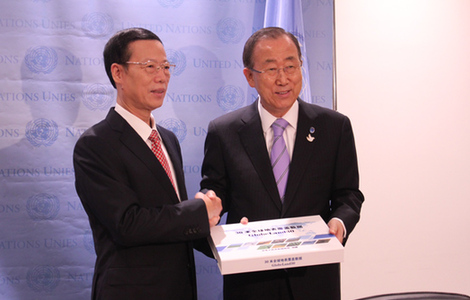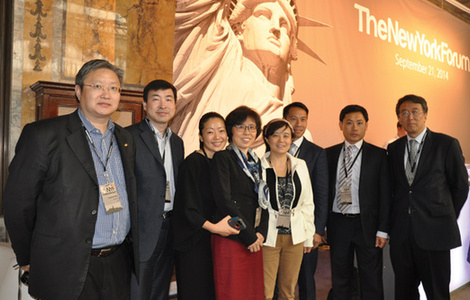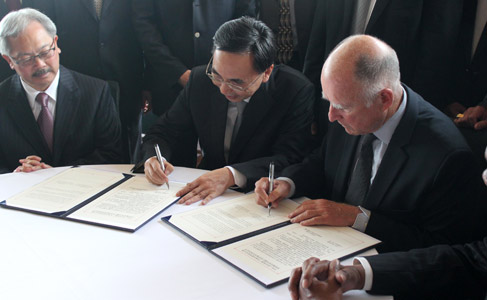Misplaced obsession with climate change
Updated: 2014-09-23 08:02
By Bjorn Lomborg(China Daily USA)
|
||||||||
Climate is back on the global agenda with UN Secretary-General Ban Ki-moon's call to world leaders to attend a climate summit on Sept 23 "to make climate change a top priority for all leaders". While it is important to find smart solutions to the real problem of global warming, claiming that on "top of the priority list is climate change" is misplaced. Perhaps this is why Chinese President Xi Jinping, Indian Prime Minister Narendra Modi and German Chancellor Angela Merkel have declined the invitation.
Moreover, the UN already knows the world doesn't place global warming first. According to The World We Want, more than 4 million people from countries across the world said their top priorities are better education and healthcare, less corruption, more jobs and affordable food. In the very last place, as priority number 17, comes global warming. Is this surprising? If you're Mamata Begum from Bangladesh who struggles to feed her children, nutrition is your top priority: "When my kids haven't got enough to eat, I don't think global warming will be an issue I will be thinking about."
This is also true for China, which ranks global warming 11th on its priority list because they believe that there are more important things to fix. Even Europeans, with the world's strongest climate policies, rank global warming 10th on their priority list.
Yet politicians use catastrophic alarmism to bolster their claim that climate is our "generational mission". Christiana Figueres, the UN climate chief, tells us that we should focus more on global warming because of the "increase in the frequency and intensity of natural events and disasters", which is simply wrong. If we want fewer weather-and climate-related disasters in the future, we should focus on better policies to keep people out of harms way through building codes, and better warning and better adaptation systems.
In an analysis of climate communications, the University College of London found that scare-mongering is ineffective when it comes to climate change and often prompts people to suspect that "they are trying to manipulate me". Remember when former US vice-president Al Gore told us in his speech while receiving the Nobel Peace Prize in 2007 that the North Pole ice cap is "falling off a cliff" and it could be gone in "as little as seven years. Seven years from now". That is now. Arctic ice has definitely declined, but nowhere near the 100 percent reduction that Gore predicted. It has reduced by only 17 percent in September.
The UN secretary-general declares that climate poses "sweeping risks" while we're heading toward a "cataclysm". Yet, according to the Intergovernmental Panel on Climate Change, the total cost of climate change by the 2070s would be less than 2 percent of world GDP. This is a problem but not the end of the world. Weigh the 2 percent loss to the 800 percent richer the UN expects the world to be in 2070.
Compare it to the very real challenges that the world faces today. About 1.2 billion people are still living in abject poverty, and they need economic growth. Over the past 30 years, China has lifted 680 million people out of poverty - the biggest poverty reduction rate ever - and it did so with lots of cheap if very polluting coal.
Yet well - meaning Western leaders will descend on New York to reiterate the solution to global warming that has failed for more than two decades: we must switch to renewables, they will say.
But this is hypocritical. According to the International Energy Agency, the rich world gets just 8 percent of its energy from renewables and just 0.9 percent from solar and wind. In contrast, Africa gets almost 50 percent from renewables, but that is because it is poor - the renewables are mostly firewood that kills more than half a million people a year with indoor pollution, forces women to waste 10 hours each week collecting firewood and contributes to deforestation.
Not surprisingly, when African leaders came to Washington at the invitation of US President Barack Obama recently, they said they wanted to use more coal. Even the climate-worried World Bank president accepted that "there's never been a country that has developed with intermittent power".
A new study by the Center for Global Development shows the cost of pushing renewables. Spending $10 billion on renewables in Africa can lift 20 million people out of poverty. But spending $10 billion on gas would lift 90 million people out of poverty. Insisting on renewables means deliberately leaving 70 million people in poverty.
This does not mean we shouldn't tackle global warming. But we need to realize renewables are still too expensive. Some campaigners claim that renewables are "already competitive". But this is wishful thinking - if they were, they wouldn't need subsidies. Look at Spain. With lower but still substantial wind subsidies, Spain has this year put up just one wind turbine.
Instead of wasting billions of dollars in subsidies, we should invest much more in green innovation to reduce the cost of future generations of clean energy. When we innovate the price of green energy below fossil fuels, everyone will switch.
But in a world where 4 million people die each year from burning firewood and dung cakes in open fires inside homes, while poverty, lack of clean water, infectious diseases, poor education and too little food afflict billions we cannot with a straight face claim that climate should be our top priority.
The author is director of the Copenhagen Consensus Centre.
(China Daily USA 09/23/2014 page13)
Most Viewed
Editor's Picks

|

|

|

|

|

|
Today's Top News
UN chief calls for intensified efforts on sustainable growth
Rice talks about relations between US, China
Xi stresses military headquarters' loyalty
Guideline helps battle against terrorism
Alibaba's IPO is only just the beginning: Ma
US group seeks 'no vacancy' for China's hotels
Rio expo gives China a showcase for its oil industry
Alibaba makes IPO history
US Weekly

|

|















